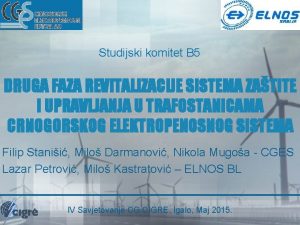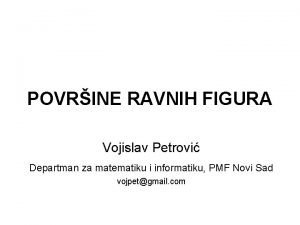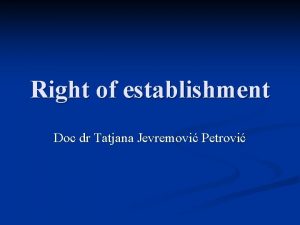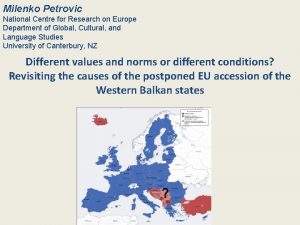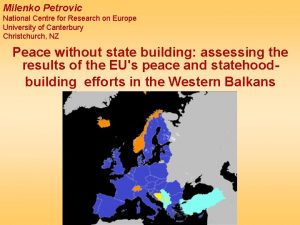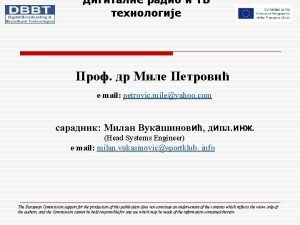Milenko Petrovic National Centre for Research on Europe






- Slides: 6

Milenko Petrovic National Centre for Research on Europe Department of Global, Cultural, and Language Studies University of Canterbury, NZ Different values and norms or different conditions? Revisiting the causes of the postponed EU accession of the Western Balkan states

Different values and norms or different conditions? Revisiting the causes of the postponed EU accession of the Western Balkan states 1. A similar EU approach to all European post-communist states during the 1990 s and early 2000 s 2. The change of EU approach towards new enlargements and new conditions after completion of the 2004/2007 enlargement round 3. Some lessons and conclusions

1. A similar EU approach to all European post-communist states during the 1990 s and early 2000 s 1. 1. The beginnings: PHARE, Association Agreements (AA) and ‘Aid Package’ for Yugoslavia during 1990 -91, but different responses from Central Europe and SEE: Victory of ex-communists (or national populists in Cro and B&H) in all SEE states – no real reforms; problematic relations with the West and the EU - lack of foreign technical/administrative and financial assistance for reforms; civil wars in Croatia and Bosnia and Herzegovina –irrelevance of the Copenhagen EU accession criteria (defined in 1993) for these states 1. 2. Acceleration in the late 1990 s: opening of negotiations for accession with the first five CE and Baltic states (1998) and the launching of “a coherent strategy” (1997) and the Stabilisation and Association Process (SAP) in 1999 for the Western Balkans with the (deserved) Copenhagen-plus conditions : • reestablishment of regional and bilateral political and economic cooperation • the return of refugees, • respect for the Dayton Peace Agreement on Bosnia and Herzegovina, and • cooperation with the ICTY in The Hague and 1. 3. Culmination, in the early 2000 s: • accession of 8 post-communist states (together with Cyprus and Malta) into the EU in 2004, the decision to open talks with Turkey and admit Romania and Bulgaria in 2007, the launch of the EU Neighbourhood Policy, and • a reaffirmed EU perspective for the Western Balkan states on many occasions during the early 2000 s and the adoption of the Thessaloniki Agenda in 2003: ‘The Western Balkans … is a high priority for the EU. The Balkans will be an integral part of a united Europe’

2. The change of EU approach towards new enlargements and new conditions after completion of the 2004/2007 enlargement round 2. 1. Enlargement fatigue and the tightening of the accession criteria for new candidates ● Despite initially positive economic trends on both sides of the post-2004 EU, the European Council, under pressure by the increased fears in the ‘old’ EU member states of the capacity of EU institutions to absorb the accession of new ‘poor’ and politically unstable countries, decided to reactivate the importance of the EU’s absorption capacity accession criteria (June 2006), and the EU commission introduced a tougher tool for the adoption and implementation of (an already increased number of) acquis chapters (Copenhagen-plus conditions) for current and new membership candidates (November 2006) 2. 2. Results and Consequences ● By June 2011 Croatia and Turkey had more accession negotiation talks with the EU (since October 2005) than any accessory state of the 2004 and 2007 enlargement, while the progress of the potential candidates from the Western Balkans in SAP (i. e. the pre-accession process) since 2005 has significantly decelerated (Table 1) ● A lack of real EU interest in finding a long-lasting solution to statehood problems in the WB – no single or coherent EU approach towards individual countries’ statehood status, but different proposals/solutions for similar problems: centralisation in B&H, the decentralisation/dissolution of Macedonia, Serbia and Montenegro, and Serbia (with Kosovo) – the ‘partial’ EU recognition of Kosovo’s independence as the most serious problem ● Some of the ‘key conditions’ for further progress in accession to the EU of the Western Balkan states have more to do with the responses to and consequences of the recent EU incentives for the solution (or lack of solution) of their constitutional/statehood problems than with the original “Copenhagen accession conditions” defined in 1993 for all post-communist European states or the SAP conditions defined in the late 1990 s for the Western Balkans states -the cases of Serbia (progress “in the Belgrade. Pristina dialogue”) and Macedonia (overcoming the 23 -year-old dispute with Greece over its name) are the most obvious and somewhat paradoxical examples

Table 1. Progress in Stabilisation and Association Process Country Albania Bosnia-Herzeg. SA Agreement Application for EU Membership YES (12/06/2006, in force since 1/04/09) YES (16/06/2008) - YES (28/04/2009) NO Official Candidate Status YES (27/06/2014)** NO Croatia YES (9/04/2001, in force since 1/02/ 2005) YES (20/02/2003) YES (18/06/2004, acc. neg. Oct. 2005 to June 2011; EU member, 1/07/2013) Macedonia FYR YES (9/04/2001, in force since 1/04/2004) YES (22/03/ 2004) YES (16/12/2005)** Montenegro YES (15/10/2007, in force since 1/05/10) YES (15/12/2008) YES (17/12/2010, acc. neg. opened in June 2012) Serbia YES* (in force since 1/09/2013) * YES (22/12/2009) YES (1/03/2012) frozen pending further Serbian cooperation with the ICTY from 29/04/2008 to 7/12/2009 ** accession negotiations are still waiting to be opened

3. Some Lessons and Conclusions 1. All the post-communist states heavily relied on Western and particularly EU assistance in coping with the challenges of post-communist political and economic transition, but the assistance which the Western Balkan states have received in comparison to their counterparts in ECE and the Baltics, has been both insufficient and (often) inadequate. 2. While the peoples from the Western Balkan states can hardly blame anyone but themselves and their political leaders for their poor political choices in the early 1990 s that deprived them of foreign assistance and closer association with the EU, their responsibility for the further postponement of accession of their countries to the EU after the mid-2000 s is far less obvious. 3. The initial success in reform and a strong commitment of the political elite and (the vast majority) of the population in these states to meet EU conditions/norms since the early 2000 s (Petrovic, 2013; Petrovic, Smith, 2013) have confirmed that – when well supported by external factors and the EU in particular – the Balkan peoples are able to reach the (western) EU values and norms. 4. However, instead of more assistance and encouragement, there were new and tighter “Copenhagen-plus” conditions for the new candidates for EU membership from the Western Balkans after 2006. • Requirements for coping with the ill prepared EU/international incentives for resolving the contested statehood status of multi-national Western Balkan states (a major source of continuing political instability of these states) have become burden and a fourth layer of conditions in addition to the original Copenhagen ones which this group of countries have to face on their way to EU accession.

